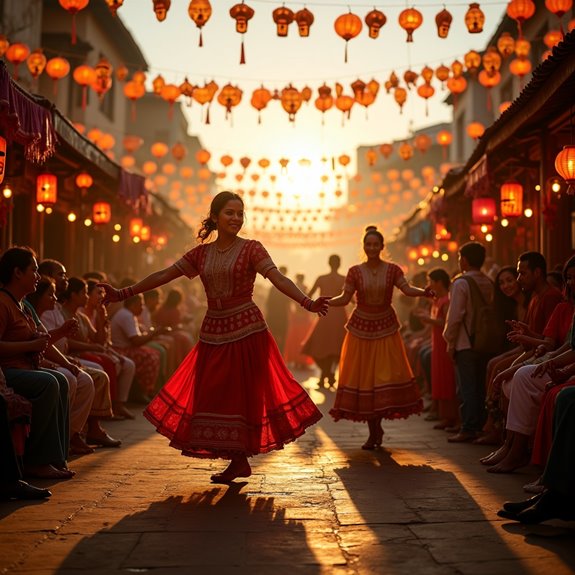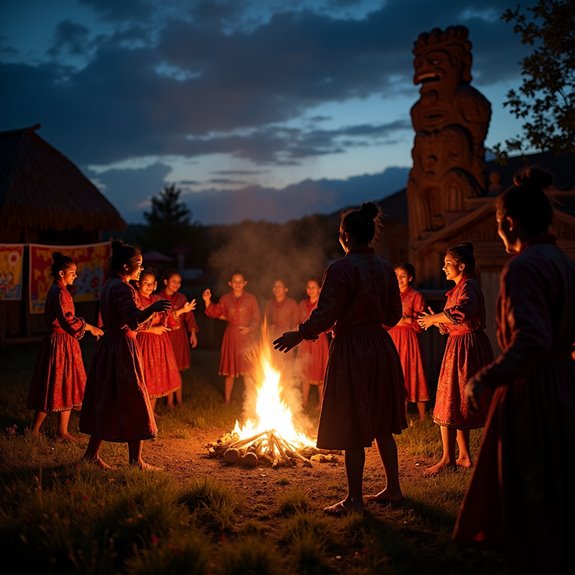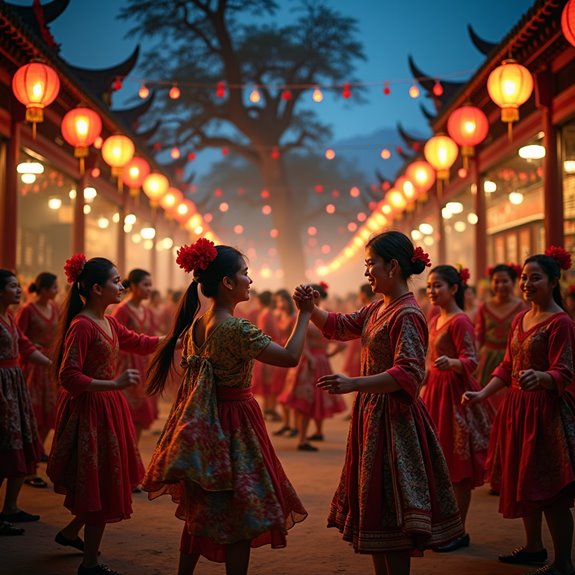Folklore and Festivals Still Celebrated Today
Folklore and festivals play an essential role in shaping contemporary culture, serving as a bridge between past and present. Many communities still celebrate ancient rituals, like Diwali and Halloween, which carry deep historical significance. These events not only foster a sense of belonging but also adapt to reflect modern values. The evolution of these traditions sparks questions about their relevance today and the stories they continue to tell. What aspects will endure, and which will evolve further? In the folk traditions of New England, there is a rich tapestry of customs, from apple picking in the fall to the enchanting sounds of folk music that echo through town squares. These practices not only honor the region’s history but also invite new generations to partake in their vibrant legacy. As communities gather to celebrate these time-honored events, they ensure that the essence of their cultural identities remains alive and relevant in a rapidly changing world.
Introduction

Folklore and festivals hold a mirror to a community’s identity, showcasing traditions that often blend the past with the present. These vibrant celebrations serve not only as a connection to heritage but also as a platform for communal bonding. People gather to share stories, music, and dances that resonate with their collective experience. In urban areas, modern interpretations of these traditions evolve, reflecting contemporary values while retaining elements of their origins. This dynamic interplay creates a rich tapestry of shared history. Festivals breathe life into age-old tales, inviting new generations to participate and keep the culture alive. As communities celebrate, they reinforce their unique identities, ensuring the continuation of folklore as an essential aspect of social life.
Cultural Rituals From Antiquity

While many contemporary festivals may seem distinct, their roots often trace back to ancient cultural rituals that shaped early societies. These rituals were designed to honor deities, celebrate harvests, or mark significant life events. Communities engaged in dances, music, and feasting, weaving a sense of unity and identity among participants. For instance, the spring equinox festivities celebrated the renewal of life and often included agricultural rites that guaranteed bountiful crops. In many cultures, seasonal celebrations reflect ancestral practices passed down through generations, transmitting values and traditions. Even today, these ancient customs blend seamlessly into modern festivities, allowing individuals to connect with their heritage. As societies evolve, these rituals remind them of their shared history and the cultural significance embedded within their celebrations.
Notable Cases or Sightings

As communities celebrate festivals, they often recount notable cases or sightings that add a sense of wonder and excitement to these events. In a small town in Spain, festival-goers swear they’ve seen a ghostly figure dancing among the crowd during the local carnival. Meanwhile, in Scotland, whispers of a mysterious creature spotted near Loch Ness resurface during the annual heritage celebrations. At an autumn harvest festival in the U.S., visitors have claimed to experience unexplainable flickering lights, igniting tales of otherworldly encounters. These remarkable stories, shared over generations, not only captivate participants but also deepen their connection to cultural heritage. Such instances breathe life into festivals, drawing individuals keen to witness the extraordinary within their everyday surroundings.
Common Theories or Explanations
The fascinating stories shared during festivals often spark curiosity about their origins and meanings. Many theories attempt to explain these age-old tales. Some scholars suggest these narratives evolved as a way to preserve history, reflecting societal values and beliefs. Others argue that they serve to reinforce community ties, providing a sense of belonging through shared experiences. Additionally, there’s a belief that folklore arises from human attempts to make sense of the world, as people explain natural phenomena or life events through stories. In other instances, festivals blend various cultural influences, leading to the creation of new legends. Ultimately, these theories highlight the rich tapestry of human imagination and the need for connection within communities.
Frequently Asked Questions
How Can I Participate in These Folklore Festivals?
To participate in folklore festivals, she can research events, volunteer, and connect with local organizers. Joining community groups helps her learn traditions and discover opportunities to contribute through performances, costumes, or sharing stories with others.
Are There Any Specific Dress Codes for Attendees?
Attendees often follow specific dress codes at folklore festivals, embracing traditional costumes that reflect cultural heritage. It’s a great way to honor the event’s history, and many organizers encourage participants to wear appropriate attire for authenticity.
What Age Groups Typically Attend These Festivals?
Families of all ages attend these festivals, engaging children, teens, and adults alike. Many enjoy vibrant parades, while others appreciate traditional performances. The diverse atmosphere invites everyone to participate, making it a unifying experience for all.
Are These Festivals Family-Friendly for Young Children?
Yes, these festivals are family-friendly for young children. They offer engaging activities, like storytelling and crafts, ensuring kids have fun while parents enjoy cultural experiences. Families often leave with lasting memories and smiles.
How Do Local Businesses Benefit From These Events?
Local businesses thrive during these events as crowds flock to them. They boost sales through increased foot traffic, attract new customers, and create opportunities for partnerships that enhance visibility and community engagement. Everyone reaps the benefits!


